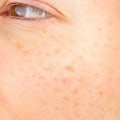We all know that smoking is bad for our health, but did you know that it can also affect our skin? Smoking has been scientifically proven to accelerate skin ageing and cause numerous other skin problems. In this article, we will explore how smoking affects our skin, the different types of skin damage caused by smoking, and the steps we can take to reduce the impact of smoking on our skin. The chemicals in cigarettes, such as nicotine and tar, are known to be harmful to the body. When smoked, these chemicals are absorbed into the bloodstream and travel throughout the body, causing harm to the organs and tissues. The same is true for the skin.
Smoking causes the skin to age prematurely, leading to wrinkles, sagging skin, age spots, and other signs of ageing. In addition to accelerating the ageing process, smoking also causes a number of skin problems such as acne, discolouration, psoriasis, and rosacea. These conditions are often difficult to treat and can cause embarrassment and discomfort. Finally, smoking can also increase your risk of developing certain types of skin cancers. This is due to the fact that smoking damages DNA in cells and can lead to mutations that can cause cancerous growths. So how can you protect your skin from the harmful effects of smoking? Read on to find out more about how smoking affects your skin and what steps you can take to protect yourself.
Smoking and Skin Ageing
- The link between smoking and premature skin ageing is well documented.Studies have shown that smoking can speed up the skin’s natural ageing process, leading to wrinkles, lines, age spots, and sagging skin. It has been theorized that the nicotine and other chemicals in cigarettes are responsible for breaking down collagen and elastin, two components of skin which are essential for a youthful look. Nicotine is a vasoconstrictor, meaning it narrows blood vessels, which reduces the amount of oxygen and nutrients delivered to the skin. This causes the skin to become dry and dehydrated, leading to premature ageing. Furthermore, nicotine can also act as an antioxidant, which means it can damage healthy cells in the skin.
In addition to nicotine, cigarettes contain thousands of toxic chemicals, such as arsenic and benzene, which can further damage the skin. Smoking also increases the risk of skin cancer. The toxins found in cigarette smoke can damage DNA and weaken the immune system, making it easier for the body to be invaded by cancerous cells. Furthermore, smoking reduces the amount of Vitamin A in the body, which plays an important role in protecting the skin from sun damage. Unfortunately, there is no way to completely reverse the effects of smoking on the skin. However, there are some steps that can be taken to reduce its impact.
Moisturizers can help keep the skin hydrated and minimize the appearance of wrinkles. Additionally, avoiding excessive sun exposure will help protect against further damage caused by UV radiation. Finally, quitting smoking is the best way to reduce the risk of premature ageing and skin cancer. In conclusion, smoking has a significant impact on skin ageing.
Nicotine and other chemicals in cigarettes can damage collagen and elastin, leading to wrinkles and lines. Additionally, smoking increases the risk of skin cancer due to weakened immune systems and reduced Vitamin A levels. Although there is no way to completely reverse the effects of smoking on the skin, using moisturizers, avoiding excessive sun exposure, and quitting smoking can help reduce its impact.
The Effects of Nicotine on Skin Ageing
Nicotine, an addictive chemical found in cigarettes, can have a major impact on the skin’s ageing process. Studies have found that nicotine inhibits the production of collagen, a protein found in the skin that helps keep it firm and elastic.As collagen production decreases, wrinkles and sagging can occur. Nicotine also reduces blood flow to the skin, which can lead to dryness and dullness. This is because nicotine affects the tiny blood vessels in the skin, making them constrict and thus reducing the amount of oxygen and nutrients they can deliver to the skin. In addition, smoking contributes to oxidative stress, a process which damages cells and further accelerates skin ageing.
Oxidative stress is caused by the presence of free radicals – molecules that are produced when nicotine is broken down in the body – which damage the skin’s cells. To reduce the effects of nicotine on the skin, it is important to quit smoking. Nicotine replacement therapies such as patches, gums, and inhalers can help smokers quit by providing a lower dose of nicotine without the other chemicals found in cigarettes. Additionally, using sunscreen and moisturizers can help protect the skin from further damage. Smoking is one of the most significant factors that can accelerate the skin's natural ageing process. Nicotine and other chemicals found in cigarettes have been linked to premature wrinkles, lines, yellow teeth, and dry skin.
Quitting smoking is the most effective way to reduce the impact of smoking on skin ageing. Other steps can be taken to slow down the signs of ageing, such as using sunscreen and moisturizers, eating a healthy diet, and avoiding excessive sun exposure.






